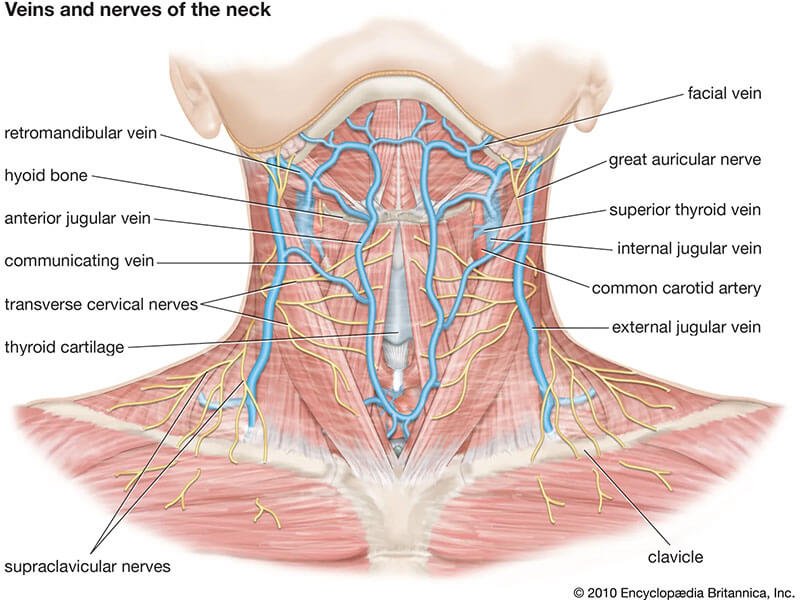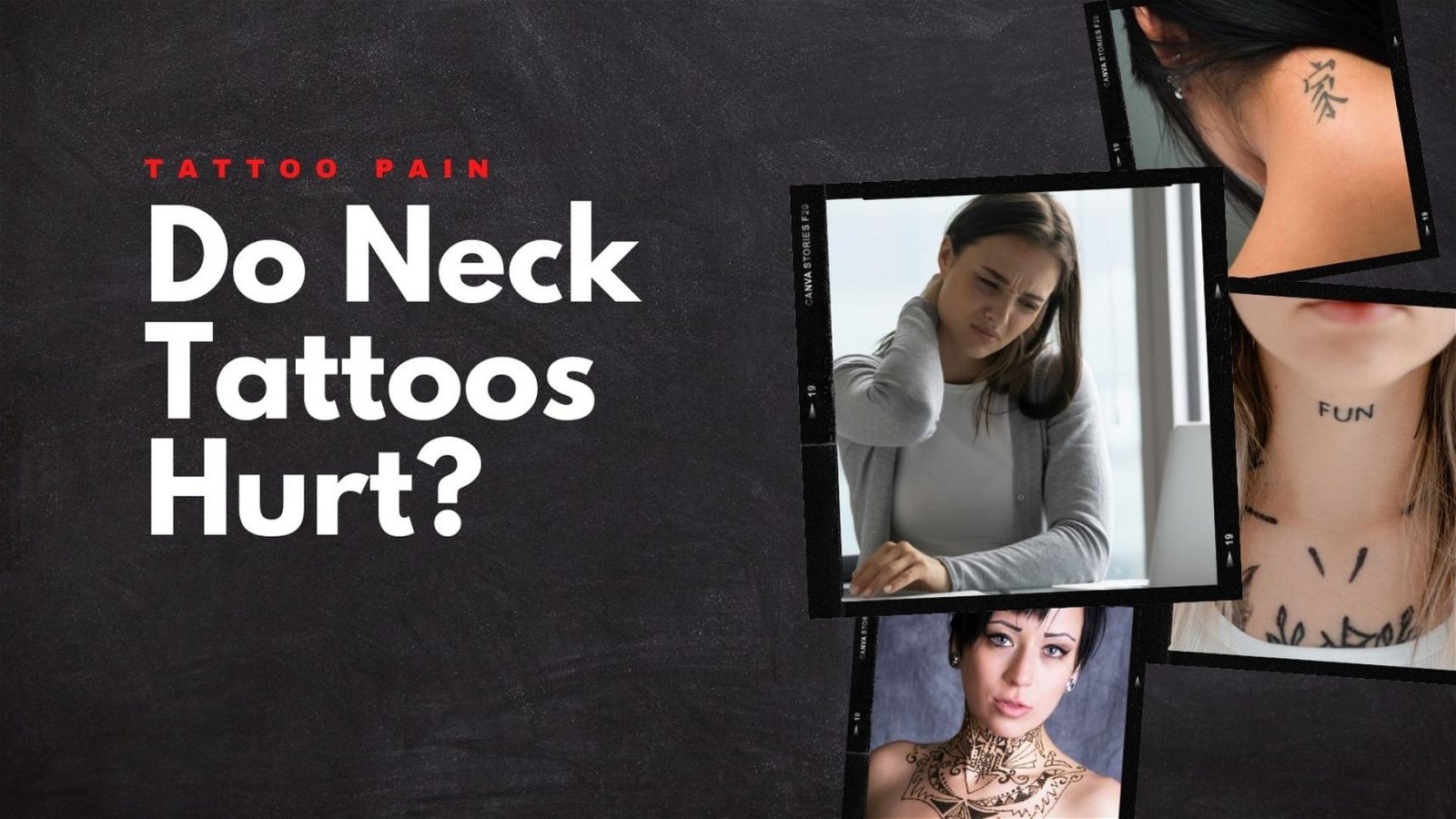You see a stylish neck tattoo, you liked how it looks, and now you think about getting one. But there’s a problem: you can’t gauge just how much it will hurt since the neck is a delicate body part.
These problems often result in second thoughts and even regret while undergoing your tattoo session, especially if you can’t tolerate the pain anymore.
Just imagine being in the tattoo chair and having to back out because you failed to gauge the pain entailed. We know it sucks.
We’ve prepared a detailed neck tattoo pain guide to avoid second thoughts and be aware of what’s coming in your neck tattoo session.
Are Neck Tattoos Painful?

With a straightforward answer: yes, neck tattoos are painful. The neck contains vast networks of blood vessels and nerve receptors that make it susceptible to pain and damage.
The neck also has little skin thickness, which significantly contributes to the pain you can experience during a neck tattoo.
The neck is also home to men’s adam’s apple, medically known as the thyroid cartilage, which the tip of the tattoo pen can directly impact.
Neck tattoo pain can still be influenced by personal pain threshold and other factors. For example, someone who has had experience getting a tattoo before already understands the pain of a tattoo. In contrast, newbies who are bold enough to try a neck tattoo as their very first tattoo may find that it hurts more than they expected.
Neck tattoo pain also depends on where specifically you like your tattoo to be. The neck areas you can tattoo are the throat, the sides of the neck, and the back of the neck.
Neck Tattoo Pain Factors

As mentioned earlier, other factors involve a person’s pain perception while having a neck tattoo. These are:
Tattoo Experience
If you’re someone with tattoo experience, you already know how much a tattoo hurts. Understanding the pain results in positive thinking and confidence that you can endure the pain of your next tattoo. It may also positively impacts your tattoo’s healing process since you had the initial experience and knowledge of carrying out aftercare for a previous tattoo.
However, if you’re a newbie, you probably don’t know how much a tattoo hurts—let alone an idea of how much a neck tattoo would hurt. Not knowing can turn your tattoo experience into a horrible one since the neck, especially the throat, is one of the most painful places to get a tattoo.
Gender
Gender can also play a role in a person’s pain perception. Even though the neck is a delicate part anatomically for all genders, pain thresholds still vary.
People believe that those who frequently encounter pain should have higher pain thresholds. But studies suggest this isn’t conclusive as females have lower pain thresholds than males.
Age
Younger people have more elastic skin than older people, and what this means is that younger people will have lesser tattoo pain compared to older people with skin elasticity issues.
This is because the tattoo pen works smoothly and efficiently on elastic and smooth skin free of wrinkles and other age-related skin conditions.
Tattoo Size
One of the biggest reasons a neck tattoo hurts is the tattoo size. A small neck tattoo should have minimal pain compared to larger ones.
This is because a larger tattoo takes longer to finish. After all, it requires a certain level of detail, such as shading, outlining, and colouring. Simply put, the longer your tattoo session takes, the longer you’ll be in pain.
Tattoo Artist’s Skill and Experience
Let’s face it, one of the most critical yet ignored factors of tattoo pain is your artist’s skill and experience. If you get a neck tattoo from an amateur and inexperienced artist, you may risk skin injuries and more problems in the long run.
An inexperienced artist may also elongate the tattoo session, which ultimately leads to more pain on your part.
It’s better to get tattooed by a certified professional tattoo artist. It’s a safer, quicker, and better option.
Neck Tattoos: Are They Worth It?
It depends. Adding a neck tattoo leads to a euphoric feeling of completing something important for people with many tattoos. However, there are things to consider if you want to know if having a neck tattoo is worth it.
Neck Tattoo Pain
As mentioned earlier, neck tattoo pain remains the most significant factor affecting how you see neck tattoos. Since neck tattoos hurt, you should weigh the risks and advantages of getting one.
If you think you can handle the pain, go for it. If you can’t, we suggest getting a tattoo somewhere else, like the calves or forearms, as they’re less painful.
Neck Tattoo Aftercare
Neck tattoo aftercare is notoriously longer than tattoos on the other parts of the body. This is due to the nature of the neck being flexible and movement-extensive.
Since the skin of the neck is too thin to accommodate its flexibility, wound healing takes longer because the neck moves too frequently. And since healing takes longer, aftercare will be longer too.
If you’re not a fan of showering your skin with TLC or tender loving care, neck tattoos will be a hassle for you.
Workplace Issues With Visible Tattoos
While it’s illegal for companies to bar tattooed people from applying, tattoos are still controversial for job employment. Neck tattoos are visible, and some companies may not be too happy with that.
To avoid workplace issues, make sure your company or the company you want to apply to doesn’t have problems with visible tattoos before you get a neck tattoo.
Ink Fading Issues
Neck tattoos fade more quickly than other body areas. The reason for this is that the skin in the neck is thin and moves quite often, so the tattoo ink tends to fade quicker.
The neck is also exposed to the sun, resulting in premature ink fading. Unfortunately, even if you do everything to prolong your neck tattoo, the sole nature of the neck being thin, flexible, and sun-exposed will eventually wear down the ink of your tattoo quicker than usual.
Professional Opinion
Many professional tattoo artists don’t recommend neck tattoos for the same reasons we’ve listed above:
- It’s painful.
- It takes too long to heal.
- It can be an issue in the workplace.
- The ink starts fading quickly.
However, if you are determined and issues are not a big deal for you, you’ll have no problems with the pro artists.
Do Back of Neck Tattoos Hurt?
Insect tattoo from a man’s nape. Photo by Elviss Railijs Bitāns from Pexels.
Yes, back of the neck tattoos hurt. This is because the nape houses the upper portion of your spine, which is full of nerve endings that carry electrical impulses to your brain.
Though the back of the neck tattoos hurt, they hurt less than the throat area since the nape contains considerable fat and muscles. Don’t get the skin above the spine tattooed, as this will hurt.
We recommend going for the lower part of the nape to avoid directly impacting the spine.
Do Throat Tattoos Hurt?
Yes, it does hurt badly. The throat contains little muscle and fat to protect it against external trauma; that’s why getting your throat karate-chopped makes you lose your breath.
This is also the exact reason throat tattoos hurt: the tattoo pen directly impacts the thyroid cartilage and several nerves and blood vessels in the area—not to mention the difficulty of breathing or gulping while getting your throat tattooed.
Conclusion
In summary, neck tattoos hurt. So if you want to get one, it will depend on whether you can tolerate the pain involved or not. Other essential factors are also involved, so you might want to consider the points we’ve listed above.
Nonetheless, neck tattoos are great pieces of art, and they can be a great way to show your personality, artistry, and confidence to the world. Enjoy your tattoo!
Sources:
- Anatomy of the neck.
https://teachmeanatomy.info/neck/
- Submental and Anterior Neck Originated Full-Thickness Skin Grafts for Periocular Procedures.
https://journals.lww.com/op-rs/Abstract/2020/05000/Submental_and_Anterior_Neck_Originated.9.aspx
- The Thyroid Cartilage.
https://www.sciencedirect.com/topics/immunology-and-microbiology/thyroid-cartilage
- Genetic contributions to pain: a review of findings in humans.
https://onlinelibrary.wiley.com/doi/10.1111/j.1601-0825.2008.01458.x
- Women report feeling pain more intensely than men, says electronic records.
https://med.stanford.edu/news/all-news/2012/01/women-report-feeling-pain-more-intensely-than-men-says-study-of-electronic-records.html
- Influence of age and regional differences on skin elasticity as measured by the Cutometer®
https://onlinelibrary.wiley.com/doi/abs/10.1111/j.1600-0846.2008.00302.x
- The Relationship Between Tattoos and Employee Workplace Deviance
https://journals.sagepub.com/doi/abs/10.1177/1096348019848482
- Why do tattoos fade?
https://www.sciencefocus.com/the-human-body/why-do-tattoos-fade/
- Anatomy of the Spine and Peripheral Nervous System.
https://www.aans.org/en/Patients/Neurosurgical-Conditions-and-Treatments/Anatomy-of-the-Spine-and-Peripheral-Nervous-System
- Anatomy, Head and Neck, Pharynx
https://www.ncbi.nlm.nih.gov/books/NBK544271/





